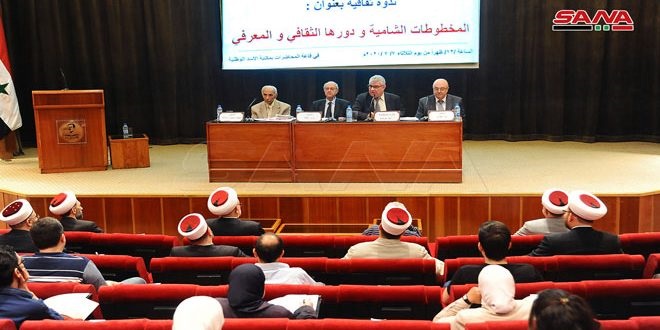Al-Assad National Library boasts tens of thousands of manuscripts, dating back to different ages that have been collected and gifted from Syrian and Arab libraries in various kinds of knowledge.
Preserved in al-Assad Library, researchers have revealed only part of this cognitive and qualitative treasure. To this end, academic researchers are hosted at the Library that holds continuous symposiums, the last of which was The Manuscripts and their Cognitive & Cultural Role.
 Among the participants was researcher Dr. Muhammad Radwan al-Dayeh, who was engaged in studying at depth a number of the most famous manuscripts in language and literature. He drew attention to the historic and scientific significance of the Levantine manuscripts, which had their origin and were hand scribed from the Andalusian manuscripts, including poetry. Al-Dayeh shed light on al-Assad library’s contents of Andalusian, Oriental or Moroccan calligraphy type.
Among the participants was researcher Dr. Muhammad Radwan al-Dayeh, who was engaged in studying at depth a number of the most famous manuscripts in language and literature. He drew attention to the historic and scientific significance of the Levantine manuscripts, which had their origin and were hand scribed from the Andalusian manuscripts, including poetry. Al-Dayeh shed light on al-Assad library’s contents of Andalusian, Oriental or Moroccan calligraphy type.
He asserted that they played an important role in the movement of Arab thought, sciences and other cognitive fields such as medicine, pharmacy, engineering, jurisprudence, Hadith (religious discourse), language and others.
Dr. Iyad al-Taba’, in his paper that he entitled ” Verifying Levantine Manuscripts”, pointed out to the great and distinguished efforts of Damascus and al-Sham(Levant) scholars in verifying ancient Arabic texts, especially since the establishment of the Arabic Language Academy Complex in Damascus in 1908, by scholar Muhammad Kurd Ali.
Kurd Ali was one of the first researchers who worked on verifying manuscripts in the twentieth century, and the first to sow a seed in this approach. Dr. al-Taba’ mentioned the books verified by Kurd Ali, elaborating on the personal attributes that he possessed, which are considered one of the pillars of this domain, in addition to how he studied and verified the manuscripts and his method of copying the original works and verifying the texts.
Dr. Nizar Abaza spoke about the scholars of the Levant who contributed to preserving, documenting and examining the manuscripts, and the importance of the great cultural and epistemological legacies they left, such as Dr. Salah al-Din Al-Munajjid, Shukri Faisal, Sheikh Taher al-Jazaery, Jamal al-Din al-Qasimi and many others. Dr. Abaza said that those manuscripts were scattered in the old libraries that the aforementioned scholars collected and preserved in al-Thahyria Library, hence the importance of their work. Afterwards, they started ‘unearthing’ these manuscripts, verifying and introducing them to the public, within the Arabic Language Complex headed by the scholar Muhammad Kurd Ali, and later on in al-Assad Library that took upon itself to preserve and educate the public on our heritage and cultural wealth.
Director General of al-Assad Library, Iyad Morshed, spoke about the role of the Library in preserving manuscripts and making them available to researchers and contemporary research. According to Morshed, a manuscript is a paper that comes alive with science, knowledge and literature. He added that the Library keeps about 19.000 manuscripts of the finest Arabic manuscripts on various topics and cognitive fields, including philosophy, science, literature and all aspects of knowledge and that they are available to researchers and scholars. He said that studies and researches have been conducted so far on about 8000 manuscripts, noting that more than 5,300 researchers have benefited from these manuscripts thanks to the Library that keeps, collects, and restores them in one of the most important sections of manuscripts restoration in the Arab region.
Rayan Faouri

